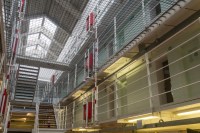The Southport killings were horrific, but should they have happened at all? We already know that the government’s counter-extremism programme, Prevent, failed to identify the risk Axel Rudakubana posed. That’s a key question which the Southport Inquiry, the first stage of which began on Monday, aims to answer.
The Home Office has said that the inquiry will ‘leave no stone unturned in uncovering how this attack happened and to not let any institution of the state deflect from their failure’. To that end the Southport Inquiry is to be ‘statutory’, meaning it will be able to compel witnesses to attend and give evidence under oath, require the production of documents and other evidence and hold its hearings in public.
Yvette Cooper, the Home Secretary, intends that the inquiry ‘will provide insights into any failings that allowed a young man with a previous history of violence, to commit this horrendous attack’. This is crucial. Unlike the fiction of Adolescence, Axel Rudakubana’s crime followed an escalating sequence of violent and disturbing behaviour. Many public bodies were aware of this. And yet no one stopped him. The inquiry must discover why.
The Home Secretary has made an excellent choice in Sir Adrian Fulford to chair the inquiry. He was Vice-President of the Court of Appeal, the first Investigatory Powers Commissioner and sentenced Wayne Couzens. He’s also seen as someone who will cut through efforts to obscure blame or shirk responsibility.
This is likely to be necessary. As we saw in the Prevent ‘learning review’ there’s a culture of avoiding blame in many of our public bodies. The inquiry’s terms of reference give its chair very broad powers. Fulford may ‘examine all evidence’ he deems appropriate, but it is expected he will examine the actions of Merseyside and Lancashire Police, six government departments, MI5, the local council and the NHS. First of all though, he intends to meet with the victims and their families, and this is also to be welcomed. As the Home Secretary said, ‘Southport was an unimaginable tragedy…we owe it to [the] families, and all those affected…to quickly understand what went wrong’. She’s right. Let’s hope Fulford lives up to his reputation and establishes whether Rudakubana could have been stopped, and what must be done differently in the future.
Fulford will need to move quickly. He is expected to provide a final report on this phase by early 2026 at the latest. After that will come phase two, which is ‘expected to consider the adequacy of multi-agency systems to address the risk posed by young people whose fixation or obsession with, and desire to commit, acts of extreme violence presents a significant risk to public safety.’ Again this is welcome. Risk management policy informed by real events must be preferable to that driven by TV drama.
This all serves to demonstrate that the government can move quickly to establish an effective, statutory inquiry when it wishes to. In this context it seems strange that Tom Crowther KC, the lawyer tasked with developing local inquiries into child sexual abuse grooming gangs, has heard so little that he had to ask the Home Office whether they still need him. If Rudakubana’s victims deserve a serious, statutory inquiry, then those hundreds of girls abused across the country absolutely do.






Comments